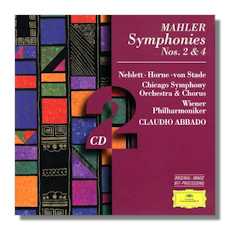
The Internet's Premier Classical Music Source
Related Links
- Mahler Reviews
- Latest Reviews
- More Reviews
-
By Composer
-
Collections
DVD & Blu-ray
Books
Concert Reviews
Articles/Interviews
Software
Audio
Search Amazon
Recommended Links
Site News
 CD Review
CD Review
Gustav Mahler

Symphonies
- Symphony #2 "Resurrection" in C minor
- Symphony #4 in G Major *
Carol Neblett, soprano
Marilyn Horne, mezzo soprano
* Frederica von Stade, mezzo soprano
Chicago Symphony Orchestra & Chorus/Claudio Abbado
* Vienna Philharmonic Orchestra/Claudio Abbado
Deutsche Grammophon 453037-2 2CDs
This two-disc set showcases some of Claudio Abbado's first recordings of Mahler. His Mahler tends to divide people, as does most of what he does, but there is little doubt in my mind that this conductor's work is best early in his career. Some may disagree, and it doesn't help my case that this set is really only half useful. While it holds his finest version of the Second, the Fourth is simply not good enough to carry any weight.
As beautifully as they can and do play, the Vienna Philharmonic is not a Mahler orchestra in the same way that say, New York carries that tradition. Mehta, Bernstein and Boulez have made good to excellent recordings with the orchestra, but by and large the tonal refinement and unwillingness to indulge in excess are at odds with the huge range of sounds that Mahler calls for. The Fourth symphony would seem to be a fine fit then, but it isn't. The fault is Abbado's. He wastes the magnificent sound in front of him, and captures none of the music's fantasy and charm. The Philharmonic sounds bored and boring as a result. For his part, Abbado seems unable to create any atmosphere. Tempos are never unreasonable, the playing is decent – it should be exceptional – and there's not much wrong overall technically. But neither is there anything of distinction. This is simply dull. Oh, right; what about the fourth movement singing? Frederica von Stade is excellent, as one might expect, but the playing behind her remains almost painfully devoid of anything noteworthy. What an unhappy performance!
The Second fares noticeably better. The Chicago Symphony is far more reliable in this music than their Viennese counterparts, although even in 1977 the orchestra hardly needed to record more Mahler. No matter, this is much more satisfying than the Fourth. Abbado favors broad first movement tempos aided by some outstanding playing. Brass is superb, but every section deserves credit. Dynamics actually exist in this recording, and Abbado thankfully utilizes the excellence in front of him. Perhaps it's not the "best", but it certainly is one of the better Seconds to come out of Chicago. I still think that Walter, Bernstein and others bring more to the table, but this is at the very least a worthy testament to a great orchestra and chorus. Taken as a whole over time, Abbado's accomplishments on disc are startlingly uneven, and while this set confirms that, it also demonstrates clearly what an abundance of talent was (and still is) on display. At budget price, this is worth looking into to celebrate what was…and could have been.
Copyright © 2013, Brian Wigman





















